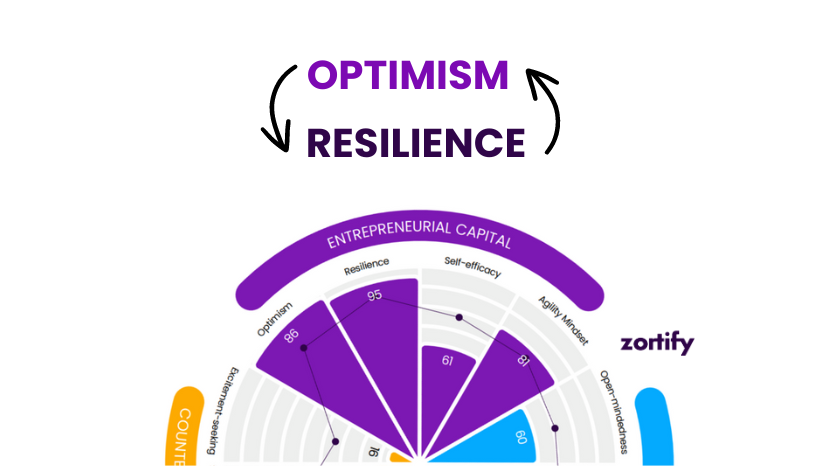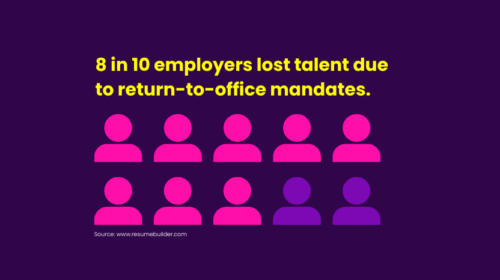Recruiting in transition: Why “Hire & Pray” is no longer enough
It is said that diamonds are only created under pressure. We wouldn’t agree with this saying when it comes to recruiting. Under pressure, our judgment suffers. Under pressure, suitable candidates are more easily overlooked or applicants are hired overhastily who later turn out not to be suitable. The cost of bad hires runs into the hundreds of thousands.
Recruiters are under pressure from many sides. They have to find the best candidates in a competitive market. The willingness of young people in particular to change jobs is higher than ever, as are their demands on employers. These demands are not only directed at the job itself, but also at the application process. Companies that fail in the candidate experience lose the best talent during the selection phase. Decision-makers, on the other hand, expect their recruiting teams to fill positions as seamlessly as possible with talented individuals who are both professionally and personally convincing.
In a survey conducted by the Society for Human Resource Management, 53 percent of recruiters surveyed stated that the stress level in their job has increased compared to the previous year. And it continues to rise with every unfilled or incorrectly filled position.
We should be talking about resilience now at the latest.
And in its actual meaning. Because contrary to what is often assumed, resilience does not mean being particularly resistant. Instead, it is the ability to pick yourself up again after setbacks and look ahead with optimism. “Ability to recover” is an excellent translation.
Resilience is a psychological resource that people can ideally activate reliably. At the same time, it is by no means only natural or fixed. We can learn and train resilience. It plays a key role in enabling us to do a good job in challenging environments, in contact with different personalities and in the face of increasingly rapid change. This is another reason why resilience is a sought-after quality that can determine whether we are the perfect fit for a position or not. But also whether we would have been the perfect fit for a position, were rejected and still go into the next job interview with confidence. And whether, when we are on the other side and have to make hiring decisions ourselves, we allow ourselves to be paralyzed by bad hires from the past or consciously remind ourselves of them in order to learn and grow from them.
And whether we do not allow ourselves to be carried away even after overwhelmingly positive experiences. But remain vigilant, focused and self-critical. We conducted a study on this in a call center, the results of which can certainly be applied to recruiting (as a special type of sales). In the study, the top performers showed significantly higher scores for resilience and self-efficacy than those employees who were not convincing on the phone.
Resilience as a top skill
The latest Future of Jobs Report from the World Economic Forum names resilience as the second most important core skill (after analytical thinking) for work in 2025. Companies need resilient people more urgently than ever before – both in recruiting and on the applicant side. The key question is: How can organizations shape the conditions for recruiting teams in such a way that they do not burn out under the increasing pressure, do not become discouraged by failures in a highly competitive and complex environment, in other words become and remain resilient? How do decision-makers, HR management, recruiters and hiring managers find a common understanding to identify the best candidates? And how do resilient recruiters find resilient employees for all roles that need to be filled?
We clearly see companies as being responsible for creating an environment in which employees can use their resources and activate them again and again. The following approaches can be particularly useful with regard to the demands placed on the recruiting team:
Reduce workload with AI
Routine tasks, such as scanning CVs or scheduling interviews, can and should be automated so that recruiters and hiring managers can focus on what comes after the first impression.
Streamline the application process
With the help of AI-based personality diagnostics, key characteristics that go beyond the CV can be identified even before the actual job interview. The Big 5, as well as optimism and resilience, are some of these characteristics. The analysis reports provide recruiters with an excellent basis for deciding who is worth inviting to an interview. Which candidates are worth investing more time in and which are simply not a good fit. This approach benefits both sides. As applicants don’t want to spend an unnecessarily long time in a selection process where their chances of success are close to zero.
Recruiters can also use the reports from the AI analysis to make the following interviews more efficient. The reports we generate with Zortify are based on open text answers from applicants. And therefore provide wonderful starting points for an in-depth dialog. Instead of working through generic questionnaires, recruiters can use the evaluations to ask specific questions about the applicant’s personality, team dynamics and working style.
Backing up decisions with data
The personality data analyzed with the help of AI helps the recruiting team to implement two key aspects of good talent selection. Even under pressure: a consistent focus on the individual and an objective comparison with other candidates. The data enables everyone involved in recruiting to develop a common understanding. And agree on what is important in the further selection process.
For example, a candidate may be perfectly qualified, but not particularly resilient according to the analysis. This is where recruiters need to assess the options: Do we give top priority to skills and prefer to invest in developing the person’s resilience on the job, or do we opt for an applicant with the second-best CV but who has a distinctly resilient personality? – By making these factors discussable and developing a shared understanding of desired qualifications, organizations reduce the pressure on recruiters, decrease bias on all sides and increase the accuracy of hiring predictions.
Creating psychological safety
An environment in which mistakes are named as such, but are also seen as a learning opportunity, reduces the pressure on recruiters and promotes their resilience. Regular feedback loops between hiring managers and executives also help to understand each other’s work and challenges and improve collaboration.
KPIs instead of “hire & pray”
It is clear that the pressure on companies will not decrease in the years to come. On the contrary: Germany will lose seven million skilled workers by 2035 as the baby boomers retire and low birth rates follow. Competition for talent is likely to intensify further. At the same time, technological development is making huge progress. Which on the one hand increases the need for new skills, but can also massively relieve the burden on companies in general and recruiting teams in particular.
AI-based analysis tools can make the recruitment process faster, more targeted and more objective. As a result, recruiters have free resources to take on a proactive role. Instead of constantly reacting to urgent staff shortages, they can focus on the question of which skills and personalities the organization really needs to grow and thrive in the long term. The aim is to move away from a reactive “hire and pray” approach towards proactive, data-driven recruiting that ensures the company’s long-term talent supply. This kind of anticipatory, strategic workforce planning goes far beyond short-term recruitment. And ensures that the right employees with the right skills are in the right place at the right time.
From panic to precision: how data-driven recruiting brings long-term success
A key lever here is the use of data and KPIs. While Sales tracks in detail how effective measures are, this systematic approach is often lacking in Recruiting. However, in order to grow with their tasks instead of cracking, recruiters need to specifically analyze which factors have led to a successful hire or a bad hire. They can significantly increase their success rate by analyzing past wrong decisions, recognizing their own bias and learning from it.
At the same time, they need to develop a deep understanding of the company’s future requirements. This includes not only assessing skills and experience, but also taking into account personality traits, development potential and career paths. In order to anticipate market trends and build talent pools at an early stage. It is more important than ever for recruiters to work closely with managers and colleagues in business development and marketing (employer branding). At first, this may sound like even more work. In fact, this kind of rethinking takes a huge amount of pressure off recruiting teams because it replaces short-term panic with long-term, sound planning. And at best, this leads to smart and sustainable recruiting strategies.
That is, strategies that produce plenty of diamonds even without excessive pressure.
Prof. Dr. Florian Feltes
Prof. Dr. Florian Feltes is co-founder and co-CEO of zortify and a forerunner in AI-supported HR innovation. Together with his team, he develops intelligent personality diagnostics and helps companies identify the perfect candidates—without expensive assessments and without bias. His vision: a world in which every company can effortlessly form high-performance teams and create work environments that allow human potential to flourish.
Finding the right talent does not allow for compromises!
Applicants want a fast, appreciative application process – companies, on the other hand, need a lot of information to prevent wrong hires, as well as efficient and structured processes to keep costs low and not make themselves liable to legal action. How does HR find the balance – and the best talent at the same time?
New Leadership: Nice is the little brother of toxic.
We think it is right and important that we as a society discuss topics such as “toxic masculinity” and clearly name corresponding misconduct as such. Language shapes our being and our consciousness; We can only describe problems and thus make them discussable if we have words for them. Toxic is such an important word.
Expensive, unloved employees: How to avoid bad hires
The start of the year traditionally brings movement into the company. Employees leave, others have to fill the gap, and new employees have to be found and trained at the same time. And the question always arises: How do we ensure that the next person really fits in with us? That they won’t leave for new shores at the next full moon or turn of the year?
New Leadership: Nice is the little brother of toxic.
We think it is right and important that we as a society discuss topics such as “toxic masculinity” and clearly name corresponding misconduct as such. Language shapes our being and our consciousness; We can only describe problems and thus make them discussable if we have words for them. Toxic is such an important word. Toxic behavior has a negative effect on many levels and we need levers to recognize it and counter it.
At the same time, I advocate using words wisely. Not to spare those who behave wrongly. On the contrary: not to take away the weight of the words.
Toxic employees and toxic executives are a huge problem for companies. Researchers at the University of Bielefeld, the Berlin School of Economics and Law and the University of Trier have found that toxic leadership behaviour (“abusive supervision”) occurs in 85% of companies. 21 percent of companies even have a highly toxic atmosphere. The effects range from lower performance to a high level of sick leave to high employee turnover and the resulting low employer attractiveness.
But how do you actually know if a manager is behaving toxically?
It is clear that not everything that is uncomfortable is automatically toxic. A toxic working atmosphere can be recognised, for example, by the following factors:
- Manipulation & fear culture: Managers play employees off against each other and fuel a climate of uncertainty and fear.
- Lack of respect & appreciation: Superiors behave disrespectfully, make inappropriate remarks, hang mistakes high and at the same time let successes fall under the table.
- Unfair or arbitrary decisions: Rules only apply to some and personal sympathies determine the career path.
- High sick leave & high fluctuation: A conspicuous number of employees want to change internally in order to evade the manager, are sick more often or leave the company because the climate is unbearable.
Managers don’t have to be nice
What is the opposite of toxic? – It is certainly not “nice”. A strong leader should not primarily be nice, but first and foremost empathetic and effective. I would even go so far as to claim that overly nice behavior can promote a toxic working atmosphere to a certain extent.
How?
Managers who confuse new leadership with being nice all the time sometimes try to maintain harmony at any cost, avoid conflict and are reluctant to say “no”. In the short term, this niceness feels pleasant, but in the long term it leads to serious problems:
- Unclear expectations: A lack of hard necessary feedback leads to uncertainty.
- Drop in performance: Employees are not challenged and therefore not encouraged.
- Inequity in the team: Weaker employees are spared while high-performers feel frustrated.
- Loss of credibility and laissez-faire: Those who cannot assert themselves lose respect. At some point, everyone does what they want and nobody does what they should.
The psychology behind too nice leadership
Why do some managers behave too nicely? – There are usually psychological reasons behind this. Humans are fundamentally social beings and strive for connection with others. This is actually good and, if used correctly, can promote an empathetic leadership style. Sometimes, however, there is another need that makes good leadership difficult: the need to be liked. This can interfere with factual decisions and often leads to managers postponing conflicts instead of addressing them, so that they continue to smoulder, poison the atmosphere in the team and reduce performance.
What constitutes effective leadership?
Good leadership, on the other hand, means being “tough” in the best sense of the word – namely honest, clear and consistent. Managers must be “legible”. For example, we advise everyone who joins a team from outside to give employees the opportunity to make appointments in which they get to know and read the manager. This way, employees know what to expect. In contrast to laissez-faire managers, effective managers express clear expectations and make difficult decisions, even those that don’t please everyone. A consistent manager sets standards, demands performance and gives feedback – even if this is sometimes uncomfortable. Consistency is not the same as toxicity. Toxic behavior is based on humiliation, micromanagement, incapacitation and fear – consistent leadership, on the other hand, is based on clarity, fairness and reliability.
Toxic or Consistent – Telling the Difference
Sometimes it is not easy to recognize whether a behavior is toxic or necessary, even if it causes resistance among individuals. Especially when there is repeated friction between managers and employees on certain topics. The following questions can help to evaluate the other person’s behavior:
- Question emotional reaction: Do I feel personally affected because I don’t like something, or is my supervisor’s behavior really destructive?
- Judging according to objective criteria: Is the decision made justified, even if it does not necessarily follow my arguments?
- Obtain feedback: How do other colleagues experience the manager’s behavior? Do they share my feelings?
- Corporate culture: Are there values and structures that enable collaborative and appreciative work?
Conclusion: A more conscious approach to toxic personality traits
Toxic employees are a major problem and can be very expensive for companies. Ideally, people with toxic behavior should not even make it onto the shortlist for important positions. AI-based personality tests can be used to identify such tendencies as early as the application process and avoid bad hires. At the same time, we need a differentiated view of human characteristics. Not all characteristics that appear “hard” to others are also toxic. Here, AI systems can also help to recognize nuances and assess the personality traits of (potential) employees and managers scale-based.
The inflationary use of the term “toxic”, on the other hand, dilutes the real problem of toxic work cultures. Only if we clearly identify the difference can we seriously combat problems and at the same time value good leadership.
Prof. Dr. Florian Feltes
Prof. Dr. Florian Feltes is co-founder and co-CEO of zortify and a forerunner in AI-supported HR innovation. Together with his team, he develops intelligent personality diagnostics and helps companies identify the perfect candidates—without expensive assessments and without bias. His vision: a world in which every company can effortlessly form high-performance teams and create work environments that allow human potential to flourish.
Expensive, unloved employees: How to avoid bad hires
The start of the year traditionally brings movement into the company. Employees leave, others have to fill the gap, and new employees have to be found and trained at the same time. And the question always arises: How do we ensure that the next person really fits in with us? That they won’t leave for new shores at the next full moon or turn of the year?
Year 2 Post-GPT: How My Year Was Shaped and Why Work Must Remain Human
December 2024 – or, in the new chronology, Year 2 Post-GPT – marking two years since the go-live of the first version of ChatGPT. Requests like “Write a rhyming speech for my aunt Hannelore’s 60th birthday” or “Draft an outline for a whitepaper on the impact of generative AI on talent acquisition”.
More Evolution, Less Disruption: 5 tangible HR trends
For companies, 2025 means less disruptive change and more evolutionary growth. In view of the overall social situation, especially with the rise of populism, the pressure is increasing not only economically, but also in interpersonal relationships. This is where companies need to take a closer look. It is more important than ever to fill key positions with people who …
Expensive, unloved employees: How to avoid bad hires
The start of the year traditionally brings movement into the company. Employees leave, others have to fill the gap, and new employees have to be found and trained at the same time. And the question always arises: How do we ensure that the next person really fits in with us? That they won’t leave for new shores at the next full moon or turn of the year?
Not everything that makes employees change jobs is in the company’s control. But a lot. Above all, they can do a lot to avoid expensive bad hires. And to always know what employees are concerned about and what they want. It’s time-consuming, but it’s worth it. A look at the costs that a bad hire can entail clearly shows this. For employees without a management position, these can run into tens of thousands of euros. For managers, companies quickly end up with costs in the mid six-figure range.
How do these costs come about?
Let’s assume a Chief Sales Officer (who we will also have on board from February – shoutout to Jan). The salary range for such a position is between €8,000 and €20,000 gross per month, depending on the region and company size.
In order to find this person, costs arise for job advertisements. Possibly headhunters (whose fees are based on the profile sought, so are correspondingly high for managers), job interviews, contract preparation and the equipment of the workplace.
This is followed by the familiarization phase. During which neither the new employee nor their team can perform to their full potential. Agreements take longer, processes have to be explained and familiarized. And both sides need time to get used to each other. According to studies, the break-even point, at which the costs and benefits of the new employee equalize, is reached after six months at the earliest. It can take up to two years to reach full productivity. Provided the new colleague fits in well with the team.
If the recruitment is successful, the cost of the new hire is already around the same amount as the employee’s annual salary.
And suddenly everyone realizes: he’s no good at all.
The new colleague’s performance falls far short of expectations, communication with colleagues doesn’t work, the tone is harsh, the team is demotivated, sick leave increases. At this point at the latest, companies can start to add up the costs that arise because the other team members feel uncomfortable, insecure or frustrated. If there is a lack of psychological safety in the team, which is largely based on good leadership, new ideas fail to materialize. Employees are sick more often and those who are there are increasingly stressed because they not only have to take on the tasks of their absent colleagues. But also have to compensate for the lack of leadership from the new colleague. In the worst case scenario, employees leave the company while the incompetent manager remains on board.
The effects go even further: customer satisfaction and the company’s image can also suffer massively as a result of poor hiring. Here too, studies show that the costs can run into the tens of thousands.
Trying to sit it out can also be costly for companies. In a survey, 30% of companies stated that they had held on to employees for between three and six months. Even though they clearly did not fit into the team. With all the negative (and expensive) consequences for the rest of the team, motivation and productivity.
If companies then reach the point of letting go of the unpleasant employee (or promoting them, as in elephant graveyard), further costs arise – for compensation payments, further and, in case of doubt, even higher salary payments (in the case of promotion) and the permanently disrupted team dynamic (here too: this can be permanently impaired in the case of promotion). At the same time, the search for a candidate starts all over again – with the costs mentioned above.
Phew.
If companies don’t have a huge ‘bad hire budget’, they need ways and means to avoid expensive bad hires at all costs. What can these be?
Personality first, skills second: Skills can be learnt, personality is there. AI-based diagnostics can be used to identify and cluster the key personality traits for the company. Without the need for time-consuming assessment centers.
Thoroughly test high potentials too: Years of management experience, top performance on paper and the right first impression. However, this should not stop HR from taking a close look at people with management ambitions in particular. A personality analysis provides insights that go far beyond first impressions and makes desired behavior visible as such. It is also worth talking to former colleagues and superiors about how they worked together.
Know your own bias and minimize it: There are more than 13 types of bias that influence our decisions in favor of or against a person. Anyone involved in the selection of candidates should be aware of those prejudices – and consciously try to overcome them. Technology can also help here. And provide an objective assessment of the person before the next step in the application process.
Prof. Dr. Florian Feltes
Prof. Dr. Florian Feltes is co-founder and co-CEO of zortify and a forerunner in AI-supported HR innovation. Together with his team, he develops intelligent personality diagnostics and helps companies identify the perfect candidates—without expensive assessments and without bias. His vision: a world in which every company can effortlessly form high-performance teams and create work environments that allow human potential to flourish.
13 + 1 Bias in Recruiting: How to Recognize and Overcome Them to Find Truly Suitable Candidates
Bias – unconscious thought patterns – can influence our perceptions and decisions. In the context of recruitment, bias can result in unfair evaluations of candidates, leaving potential untapped. This guide outlines common bias, their impact, and strategies to avoid them.
Year 2 Post-GPT: How My Year Was Shaped and Why Work Must Remain Human
December 2024 – or, in the new chronology, Year 2 Post-GPT – marking two years since the go-live of the first version of ChatGPT. Requests like “Write a rhyming speech for my aunt Hannelore’s 60th birthday” or “Draft an outline for a whitepaper on the impact of generative AI on talent acquisition”.
More Evolution, Less Disruption: 5 tangible HR trends
For companies, 2025 means less disruptive change and more evolutionary growth. In view of the overall social situation, especially with the rise of populism, the pressure is increasing not only economically, but also in interpersonal relationships. This is where companies need to take a closer look. It is more important than ever to fill key positions with people who …
Between Trump, zero-motivation-days and the “Robin Hood of talent”
Why companies urgently need a personality check
Donald Trump will be the next US president. And in social networks, the concept of paid “zero-motivation-days” is being discussed, that is days off for employees without them having to call in sick or take vacation days.
Two topics, although of different dimensions, which for us lead to one conclusion: Companies must start to face their responsibility! Responsibility for the people who work for them, but also for society as a whole. They need a straightforward “personality check” in order to find their role in these turbulent times, to develop new solutions that will secure their future, and to spark people’s enthusiasm for them as employers as well as for liberal, democratic societies, on whose existence their business success ultimately depends.
Here is our idea for an “assessment for companies” in these turbulent times.
1. Who do you want to be?
Beyond “New Work” buzzwords, ask yourself what you want to stand for, what contribution you want to make to this world, how you want to make life on this planet better and how you want to shape your organization in specific terms. Whether there will be zero-motivation days or not, one thing is clear: the hamster wheel is not an innovative place, as labor expert Hans Rusinek puts it. Journalist Sebastian Klein finds even more drastic words, raising the question of who wants to work in companies that operate under war-like conditions. Instead, we need a new definition of business success that goes beyond turnover and profit and includes responsibility for people, society and the environment.
Some of you may have already seen on Social Media (especially on LinkedIn) that the ‘School of Moral Ambition’ is currently forming as a new movement. This movement wants to specifically attract talent away from companies that exploit people and our planet. The people who engage in the School call themselves the ‘Robin Hoods of Talent’. Hundreds of people joined shortly after it was announced; well-known founders are promoting the initiative, which is likely to hit a nerve with many people these days.
Companies now need the courage to look in the mirror, make a consistent paradigm shift, challenge their own product range and present something new and better in terms of a future that is worth living.
2. How do you want to lead?
We quote Hans Rusinek once again, who says that the power of a boss is much more present for us than that of a state. Companies shape the people who work for them. Managers bear great responsibility, especially in times of great uncertainty, when many people are looking for supposedly simple solutions or longing for the “good old days”. It is up to leaders to provide orientation. They are the compass navigating through organizational change and upholding core values such as empathy, openness, respect and collaboration.
Dr Hans W. Hagemann of the Munich Leadership Group has found an easy-to-understand metaphor for this:
“Imagine you’re a parent driving through thick fog with your three small children in the back seat and you can’t see your hand in front of your eyes. Of course you’re scared. But you can deal with it by adjusting your speed, using the fog lights and paying extra attention. What about the kids? –You can of course tell them that you’re scared and that you’re prepared for a collision at any time. But as a consequence, you probably won’t be able to control the screaming in the back seats. Alternatively, you could point to the navigation system and tell them that there’s a petrol station five kilometers away where you can take a little break with popcorn. The situation is the same, you’ve told the truth, you’ve given guidance and you’re moving on. In the future, it will be a matter of dealing constructively with growing uncertainties.”
Speaking of leadership
Good leadership also involves creating an environment of psychological safety. To achieve this, the purpose and goals of the organization must be clear (see point 1). Instead of knowing all the answers, leaders should adopt a curious, questioning mindset. Be vulnerable in the best sense of the word in the spirit of ‘vulnerable leadership’. This includes listening to employees and providing a safe space for ideas and suggestions as well as criticism and concerns. ‘Failing forward’ is what it takes to achieve progress: try things out, fall flat, get up on your feet again and do better. However, this is only possible in an environment that thrives on appreciation and sincerity. It is up to leaders to promote such an environment.
HR market analyst Josh Bersin rightly says that of all HR investments leadership development creates the greatest value. Especially as leadership skills are no longer only required at the top of organizations, but are now needed at all levels considering the trend towards flat hierarchies in many companies. Selecting the right people for these key positions is more important than ever. We have conducted one of the largest studies on the subject of ‘narcissism’. It shows that young people today are more narcissistic than previous generations. This can become a problem when filling leadership positions in particular. Companies should be aware of that and use research-based and ethical personality tests to protect themselves.
3. What does it really mean to be productive?
Good leadership also comes with creating free time for employees to escape the hamster wheel and think in depth about good solutions. These free spaces, these phases of pondering, wondering and chatting at the coffee machine should be considered a valuable and natural part of doing the job. A walk with a colleague not only creates social contact (which in itself has a stabilizing effect on democratic structures), but also potentially constructive friction and therefore opportunity for new solutions. Doing the right thing can also mean doing nothing, pausing, reflecting and discarding instead of sitting in a meeting or building a PowerPoint presentation for a product that would turn out to be pointless on closer, unhurried inspection.
With such a new baseline regarding work ethics, the discussion about whether to ‘work harder’ or receive paid ‘zero motivation days’ becomes obsolete. Not to mention that a contemporary leadership style should include abolishing practices not worthy of adults, such as micromanagement and controlling every step of your employees.
Conclusion
In a society that at the moment is characterized by frustration, fear and resignation to worrying proportions, we need companies that create a ‘climate of courage’. Companies that set new standards in how we negotiate and shape the future with a spirit of innovation and empathetic leadership. More and more well-qualified people are very likely to opt for such organizations if they have the choice. Now is the time for companies to look in the mirror and do their very own personality check. No more sugar coating and greenwashing. Now is the time for real responsibility.
Check out the full interview with Hans W. Hagemann about leadership qualities and how to find them in employees.
Prof. Dr. Florian Feltes
Prof. Dr. Florian Feltes is co-founder and co-CEO of zortify and a forerunner in AI-supported HR innovation. Together with his team, he develops intelligent personality diagnostics and helps companies identify the perfect candidates—without expensive assessments and without bias. His vision: a world in which every company can effortlessly form high-performance teams and create work environments that allow human potential to flourish.
Hierarchy with AI rather than everyone at eye level?
Companies promote flat hierarchies and a culture at eye level in order to attract skilled workers. That sounds very progressive and good for employees at first glance. But why do so many people still leave the company after a short time? Why is retention, i.e. retaining talent in the organization, still one of the major challenges?
AI in HR: Overcome the fear, embrace the opportunities!
AI is neither all good nor all bad. Used correctly, it can improve the lives of many people in general and working life in particular. New opportunities are opening up in HR recruitment and development in particular, without people being ” sorted out ” or replaced by technology. Let’s take a look at what is important for a fearless, constructive and responsible approach to AI in HR.
Employee analysis with AI: Make transparent what makes us transparent!
How much transparency is good for people and companies? – In times of Artificial Intelligence, the question of transparency has come back into focus. While we had slowly become accustomed to moving through the analogue and digital world as “transparent people”, the question of how transparent people and processes may, should and must be takes on new relevance due to the increased use of AI.
Employee analysis with AI: Make transparent what makes us transparent!
How much transparency is good for people and companies? – In times of Artificial Intelligence, the question of transparency has come back into focus. While we had slowly become accustomed to moving through the analogue and digital world as “transparent people”, the question of how transparent people and processes may, should and must be takes on new relevance due to the increased use of AI. This is because AI systems are able to influence decisions that have far-reaching consequences. For example for the success of companies, but also for the working lives of many people.
Transparency = Progress
In recent years, increasing transparency in companies has been a sign of progress. Many companies have realized that it doesn’t make sense to operate in silos. And that in the face of increasingly complex challenges, it is wiser to share knowledge and collaborate across departments. The classic hierarchy pyramid no longer has a good reputation. Many young talents in particular want a working environment at eye level, and the opportunity to help shape things instead of just executing them.
In organizations of a new type, there are dynamic roles instead of fixed positions, salaries and vacation days are sometimes openly visible or negotiated in the team. Some organizations are also embracing transparency in areas that were once clearly separated from the work context, such as physical and mental health. For example, there are codes, tools and processes if the colleague cannot attend the meeting due to a panic attack or the colleague with menstrual pain is not fully productive.
The vulnerable leader
There is also a growing awareness at management level of the importance of transparency to motivate teams, build trust and make the right decisions. Managers who show themselves to be fallible also take away their colleagues’ fear of making mistakes and thus create an environment in which new things can be tried out. By openly dealing with wrong decisions and setbacks, they reduce the likelihood that they will be repeated. Ideally, they act as mentors, let their employees participate in their learning and development process. And are thus role models and compasses for their team. Those who consistently live New Leadership do not see themselves as solution providers. But first and foremost as listeners and networkers with the aspiration to connect the right personalities at the right time and to bring them into the right positions in the company.
Really understand what’s going on with AI
This is exactly where artificial intelligence comes into play and with it a new level of possible transparency in organizations. This is because AI systems enable a deep understanding of the people who are involved with the organization. Whether as applicants or employees – their behaviours, motivations and emotions.
At Zortify, we use NLP (Natural Language Processing) tools and can thus achieve a level of Active Listening that only very few people master. Instead of just looking at CVs or job titles, we use open-ended questions and let the AI listen deeply. It not only processes what is said, but also recognizes what is really meant. And it can do that on a large scale. This way, it can significantly strengthen and support human intelligence instead of replacing it. Specifically, it can help people who are making decisions about other people’s next career move to make better decisions, significantly improving the quality of their work.
Making transparent what makes us transparent
AI that uses natural language to identify the personality of candidates, analyzes their entrepreneurial capital. And can also detect whether a person has a tendency towards toxic behavior creates an unprecedented level of transparency in organizations. This helps companies to find people who are a perfect fit for them. Expensive misplacements are avoided; team spirit and innovative strength are improved.
A look at the numbers:
- Time it takes for a new hire to reach full productivity after a previous misplacement: 1 to 2 years
- Time from new hire to profitability at middle management level: 6 months
- Percentage of companies reporting a decline in morale due to poor hiring: 37%
Applicants also benefit because they are more likely to find a position that matches their personality in a company that shares their values.
However, it is also clear that this level of transparency places high demands on the ethical handling of the systems that generate it, i.e. AI. You could also say that a technology that makes people increasingly transparent must itself be very transparent: How does it come to its conclusions? What data does it base its analysis on? Up to what point can we understand the technology’s recommendations and where does the non-transparent part begin? What does this in turn mean for human decision-making?
Humans and AI hand in hand
We believe that humans must always be the last element in the chain when it comes to life-changing decisions. We see a future in which human and artificial intelligence work hand in hand, with humans having the final say. An ethical approach to transparent information begins with the question of ‘what for’? The use of AI must never be an end in itself, but must serve a clear goal. Ideally, this should be to change the (working) lives of everyone involved for the better.
In detail:
- Recruiting: With transparent information, HR can identify candidates who align with the company’s values and goals. Win-win for companies and applicants.
- Team dynamics: Transparency can foster trust and understanding between colleagues, allowing for better collaboration.
- Self-efficacy: AI gives individuals insights into their unique characteristics, which can strengthen understanding of one’s actions, self-awareness, and social interaction.
- Ownership: Knowing one’s own personality can help people feel responsible for themselves and their personal development and proactively drive it forward.
- Leadership: Leaders who know their strengths and weaknesses and accept their vulnerability can create a humane and appreciative work environment.
- Unleashing potential: Personalized employee development leads to individuals thriving in their roles.
- Equal opportunities: By recognizing socially desirable behavior as such and looking behind the façade, AI creates better conditions for equal opportunities and diversity.
Prof. Dr. Florian Feltes
Prof. Dr. Florian Feltes is co-founder and co-CEO of zortify and a forerunner in AI-supported HR innovation. Together with his team, he develops intelligent personality diagnostics and helps companies identify the perfect candidates—without expensive assessments and without bias. His vision: a world in which every company can effortlessly form high-performance teams and create work environments that allow human potential to flourish.
Employee analysis with AI: Make transparent what makes us transparent!
How much transparency is good for people and companies? – In times of Artificial Intelligence, the question of transparency has come back into focus. While we had slowly become accustomed to moving through the analogue and digital world as “transparent people”, the question of how transparent people and processes may, should and must be takes on new relevance due to the increased use of AI.
How to find and promote optimistic and resilient employees
Today’s working world puts the resilience and optimism of many people to the test. Digitalisation and automation require employees to regularly adapt to new technologies and working conditions. This calls not only for flexibility, but also emotional stability. According to the ‘State of the Global Workplace’ report by Gallup (2022), 44% of employees worldwide stated that they are under stress every day.
Hybrid work personality: The ‘person first’ approach and the role of AI
AI-based personality assessments can make a significant contribution to optimizing hybrid working environments. A recent survey found that 8 out of 10 employers have lost talent due to the obligation to return to the office, underlining the need for a balanced and personalized approach. ‘Person first’ as an extension of “people first”.
How to find and promote optimistic and resilient employees
Today’s working world puts the resilience and optimism of many people to the test. Digitalisation and automation require employees to regularly adapt to new technologies and working conditions. This calls not only for flexibility, but also emotional stability. According to the ‘State of the Global Workplace’ report by Gallup (2022), 44% of employees worldwide stated that they are under stress every day. Burnout rates continue to rise. A survey by the McKinsey Global Institute (2021) found that 42% of employees are concerned about workplace stress and its impact on their mental health. Added to this are the numerous global crises that are affecting people’s psychological well-being.
Those who are optimistic tend to be more resilient
We admit the numbers do not exactly scream “Feel positive!”. This makes it all the more important for companies to focus more on resilience and optimism as characteristics.
Resilience refers to the ability to overcome setbacks and difficult situations without falling apart. Resilient people always find the strength to recover and emerge stronger from crises. They remain focussed on their goals even in the face of difficulties and tend to learn from past experiences and use this knowledge to master future tasks.
Optimism, on the other hand, describes the ability to see challenges as opportunities for growth and further development. Optimistic people have a positive attitude that makes it easier for them to deal with obstacles. Through their optimistic view of the future, they can overcome fears and inspire others to take action, even those who may doubt or hesitate.
While these two characteristics are independent aspects they can also reinforce each other. In combination with a strong sense of self-efficacy, people with a positive attitude to life are more likely to trust in their ability to overcome problems, even in difficult situations. Studies show that optimistic people react more resiliently to stressful situations.
The positive consequences of positive thinking
Companies that specifically hire optimistic and resilient people benefit on several levels:
- Performance and productivity: resilient and optimistic employees remain productive even under pressure and overcome challenges more easily. They are more flexible and have a high frustration tolerance, which is an advantage in times of constant change. A study by McKinsey shows that companies that implement targeted resilience programmes achieve a 22% increase in employee satisfaction and productivity.
- Cost efficiency: Companies save costs in the long term, as employees with these characteristics are less likely to be absent due to illness and have a lower risk of developing burnout. According to a study by Deloitte, companies can reduce sick leave by up to 29% by implementing programmes to promote resilience.
- Innovative spirit: Optimistic employees see problems as challenges and develop creative solutions. A study by PwC shows that companies with more resilient teams are 1.5 times more likely to develop innovative products and solutions than companies with less resilient teams.
- Positive team dynamics: Teams made up of resilient and optimistic members are able to resolve conflicts better and work together more efficiently. These employees contribute to a positive working atmosphere that strengthens the entire team.
Finding optimistic and resilient employees with AI
AI can help companies recognise and promote optimism and resilience in (potential) employees in a number of ways. When recruiting, AI-supported systems can analyze application documents, social media profiles and work samples to find indications of resilience and optimism. AI-based personality diagnostics, like the ones we use at Zortify, are able to identify personality traits that indicate a high level of resilience or an optimistic attitude based on free-text answers to everyday questions. The risk of social desirability of answers is significantly reduced by AI.
AI-supported personality analyses can also make a difference when selecting and developing existing employees – especially when it comes to leadership positions. Optimism and resilience are important characteristics here. Hans Werner Hagemann from the Munich Leadership Group, one of our partner companies, has correctly stated that in the future, leadership must entail ‘shaking up’ employees in a controlled manner. In other words, making them insecure in their tried and tested behavioral patterns in order to push them out of their comfort zones without frightening them. This works best with an optimistic attitude, which prospective leaders already carry within them at best. AI can make it visible.
AI systems can also measure the mental state and well-being of employees by analyzing written texts and deriving automated reports and recommendations for leaders.
What to do with the less optimistic?
Of course, not all employees are optimistic or resilient by nature. However, this does not disqualify them for tasks with more responsibility or as team leaders. Firstly, it is important to identify the causes. These often lie in stress, overwork or personal problems. Managers should therefore be able to recognise warning signs and act appropriately. There are numerous programmes that help employees to strengthen their resilience, such as mindfulness training, stress management programmes and psychological counseling.
Optimism can also be trained. Neuroscientific findings show that regular positive thinking ‘reprogrammes’ the brain. Neuronal plasticity can create new thought patterns that lead to greater resilience and emotional stability in the long term. Methods such as journaling, cognitive restructuring or consciously focussing on positive events can help with this.
Creating a positive corporate culture
Companies must aim to establish a corporate culture that empowers employees. People who feel self-efficacy and trust in their abilities often find it easier to cope with changing conditions. An environment in which mistakes are not immediately punished, but instead result in a learning process, gives employees the confidence to get involved and try things out. Last but not least, companies should communicate that it is okay not to be okay sometimes, that crises are part of life and that employees are also seen as human beings with their fears and worries. A corporate culture that promotes optimism and resilience not only attracts new talent, but also helps to retain existing employees. A study by LinkedIn shows that 72% of professionals state that a positive work culture is a decisive factor when choosing their employer.
Round-up: Our top 5 ways to a resilient organization:
- Measuring optimism and resilience right from the recruitment stage. AI avoids social desirability.
- Provide coaching programmes to train resilience and optimism.
- Train managers in active listening.
- Accept mistakes and learn from them together.
- Continuously use AI-based personality diagnostics to visualise potential deficits, progress and development opportunities.
Prof. Dr. Florian Feltes
Prof. Dr. Florian Feltes is co-founder and co-CEO of zortify and a forerunner in AI-supported HR innovation. Together with his team, he develops intelligent personality diagnostics and helps companies identify the perfect candidates—without expensive assessments and without bias. His vision: a world in which every company can effortlessly form high-performance teams and create work environments that allow human potential to flourish.
Hybrid work personality: The ‘person first’ approach and the role of AI
AI-based personality assessments can make a significant contribution to optimizing hybrid working environments. A recent survey found that 8 out of 10 employers have lost talent due to the obligation to return to the office, underlining the need for a balanced and personalized approach. ‘Person first’ as an extension of “people first”.
Recruit the curious!
“We run this company on questions, not answers.” This sentence comes from Eric Schmidt, Google’s former CEO. It makes it clear which characteristic the company values most in new employees: Curiosity. The recruiting strategy is correspondingly consistent: when the company was looking for engineers, it published a huge billboard with a riddle.
Good leadership: With self-reflection and unsympathetic filter
A good leader – is that something you are or is that something you become? – Let me put it this way: you are one if you are willing to become one. In other words, leadership requires a willingness to develop. Leading always means learning to lead. It is an ongoing process that is never finished, especially in the fast-paced world we live in.
Hybrid work: the ‘person first’ approach and the role of AI
Return to the office or offer flexibility and freedom? – Hybrid working combines the best of both worlds. At the same time, it presents organizations with challenges in maintaining productivity, engagement and wellbeing. Understanding the different personalities in teams has never been more important. Hybrid work environments require hybrid recruitment and development strategies, namely those that add a third pillar to the personal impression and the facts from CVs and application documents: AI-based personality assessments that make it possible to find out what really makes someone tick and what he or she needs to be able to work well. They can make a significant contribution to optimizing hybrid working environments. A recent survey found that 8 out of 10 employers have lost talent due to the obligation to return to the office, underlining the need for a balanced and personalized approach. ‘Person first’ as an extension of “people first”.
Why personality is important in hybrid work
Hybrid work environments affect different personality types differently. Introverts, for example, tend to thrive in structured hybrid environments, while extroverted employees tend to struggle with the isolation of remote work. There can be no one-size-fits-all solution, simply because companies should have an interest in forming heterogeneous and diverse teams. After all, these are proven to be more successful. This means that companies must also act strategically with regard to working environments to ensure that collaboration works well.
Form determines performance
The ‘Extended Mind Theory’, for example, states that our thinking must always be considered in conjunction with our environment. Where someone works therefore has a significant influence on how that person works. Companies should ask themselves what resources their employees have access to in order to think and perform well, and whether these are sufficient. After all, employees’ potential sometimes lies untapped because the spatial conditions do not allow them to develop in a way that suits their personality. Or to put it positively: Companies should be aware of the different preferences when designing work environments in order to promote the strengths of their employees.
Personalized recommendations for greater productivity
Based on the personality data analyzed with the help of AI, HR can make personalized recommendations for employees to make their day-to-day work more productive and enjoyable. These recommendations can relate to a variety of aspects, such as the selection of the ideal work location (whether in the office or working from home) or the use of suitable communication tools (e.g. video conferencing vs. chats). Similarly, employees who work better in quiet environments could receive specific suggestions for office areas that meet their needs. Last but not least, AI can help to put together teams in such a way that employees with complementary personality traits work together in the best possible way. This personalized and balanced approach not only promotes employee efficiency, but also their well-being and satisfaction in the workplace.
Prof. Dr. Florian Feltes
Prof. Dr. Florian Feltes is co-founder and co-CEO of zortify and a forerunner in AI-supported HR innovation. Together with his team, he develops intelligent personality diagnostics and helps companies identify the perfect candidates—without expensive assessments and without bias. His vision: a world in which every company can effortlessly form high-performance teams and create work environments that allow human potential to flourish.
AI literacy: These are the key skills for modern HR work
The use of AI systems will revolutionize the HR sector. Not using AI is no longer an option. It is now a matter of developing the necessary skills to be able to use the technology in a targeted manner. HR professionals need to start equipping themselves with the knowledge they need to use AI tools effectively while retaining the invaluable human judgment that machines cannot replace.
Employee diagnostics: What do you care about my personality?
Which personality traits should companies definitely know about their employees? How are behavioral expectations in the work context changing with the new generation of young employees (GenZ)? Why should companies therefore take a very close look at the characteristics of future leaders in particular?
HR should focus far more on personalities!
The so-called “hard” skills that companies need are changing faster than ever before. Today’s expert skills will be yesterday’s news tomorrow. What remains are the supposedly “soft” skills and people’s personalities. The better companies know their employees, the better they can assess who they should invest in in terms of professional and personal development.
Empowered teams: doing the right thing
(instead of doing everything right)
What is more important on the job – doing things right or doing the right things? – Most people will probably answer “both”. Nevertheless, in the context of changing corporate cultures, it is worth thinking about this question in its absolute either-or variant. For a long time, companies were primarily concerned with doing things right. To put it simply: Always work through what has been ordered and don’t make any mistakes. In the world we live in today, this approach no longer works very well. In the face of a rapidly changing environment, companies are constantly having to decide what is the right thing to do. Even at the risk of making mistakes.
Stronger in a swarm
To do this, they need teams that can dynamically align their working methods and roles with what needs to be done, using their collective strengths and insights. Because one thing is clear: No one can solve the complex challenges of our time alone. No one, not even the person with the most impressive job title, can always know which path is the right one. This requires the senses, experience, insights and skills of many people.
But what is the best way to bring these to the table?
When we talk about the transformation of companies and the associated cultural change, it is usually about giving more authority and responsibility to individual employees. However, this is only one aspect of team empowerment. Before that, the focus should be on what the individual can and wants to contribute to the team. Employees’ knowledge, talents, skills and competencies do not have the same quality and relevance at all times and for every task. Take “knowledge”, for example. This is considered a valuable skill in the knowledge society. But how valuable is knowledge that cannot be translated into concrete action? Knowledge without knowing how to bring it into the team in a meaningful way is useless for companies.
Banal yet ingenious: measuring preferences and strengths
What companies need today are employees who want to actively shape the world around them with what they are really good at. And who can translate their knowledge and skills into meaningful action in collaboration with others. How well and how quickly transformation takes place. And whether companies manage to change in the long term depends on the skills of each and every individual. And the skills of teams as engines in companies.
For these engines to run well, the individual parts must be anchored in the company with the right tools. We have developed the so-called “Preferred Performance Contributors” (PPCs) as effective tools. PPCs represent a new, innovative approach to team dynamics. In contrast to traditional management tools and personality assessments, which often promote generic roles and stereotypes, they focus on the natural inclinations and individual strengths of team members. They help to identify specific preferences through which employees prefer to contribute best to team success.
We have identified six areas of preference:
- Vision & Ideation
- Networking & Promotion
- Creation & Prototyping
- Structuring & Facilitation
- Analysis & Criticism
- Scaling & Production
The individual PPCs are determined in three ways:
- Through a self-assessment by the employee: How do I want to contribute?
- (optional) through peer feedback from colleagues: Where did you perceive me particularly strongly?
- through an AI-based personality test specially developed by us: From what I know about you, the following preferences are likely.
The AI test uses an algorithm that extracts relevant personality traits from answers to open text questions. And creates an AI-supported prediction of the PPCs.
The result of the analysis is a ranking of the six PPCs for each employee. It is important to emphasize that all contributions are in principle equally valuable. For companies, it is important that they can play out the right preferences in the right combination at the right time.
An example from one of our customers, a large software company: The team wondered why they never managed to meet deadlines. Many products were far from market-ready. Instead, they kept developing new features with great enthusiasm and energy. The analysis finally shed light on the situation. As it showed that the PPCs “Scaling and Production” were not among the top 2 preferences for any of the team members. “Creation & Prototyping”, on the other hand, were strongly favored. This gave the team a basis for rethinking tasks and roles so that they can bring products to market on time in the future.
In principle, employees can meet all preferences, but depending on their personality type, one may suit them more than the other. Intuitively, we probably tend to want to expand our strongest preferences with additional skills and experience. At the same time, it can be exciting (or necessary) to delve into the less obvious areas of preference. Either way, the analysis provides a good basis for discussing individual preferences and strengths with colleagues and positioning the team well for upcoming tasks. A nice side effect: psychological safety and the feedback culture in the team are also strengthened.
World in motion – teams in motion
PPCs empower teams to constantly redistribute roles and responsibilities in order to do the right thing and avoid major mistakes. A reorganization can result, for example, from new external conditions or from changing preferences among the team members themselves. This is because skills and preferences change over time and depending on the phase of life. For example, an employee who has always been a gifted networker in the forefront but suddenly has to care for a relative may want to focus more on providing structure and support in the background. Or they may want to take on a role that perhaps does not match their previous PPCs at first glance. But which they can fill well in their current situation with appropriate further training.
Perhaps the results of the AI analysis (in which desired answers have little chance) will inspire them to look at possible new roles. That they have not yet considered based on their self-assessment and colleague feedback (both of which tend to fall into certain patterns).
The example shows very nicely that PPCs are not fixed attributions. But primarily promote dialog and awareness in teams and ensure that employees do not wither away in their silos, but can become as effective as possible. And that from day one in the company. If new employees are familiar with their preferences and role expectations, they can reach their full potential more quickly. PPCs turn them from pure skill owners into skill users and ultimately – ideally – into drivers of change and transformation, driven by the need to do the right thing. Even at the risk of not always doing everything right.
A good team can handle that.
Prof. Dr. Florian Feltes
Prof. Dr. Florian Feltes is co-founder and co-CEO of zortify and a forerunner in AI-supported HR innovation. Together with his team, he develops intelligent personality diagnostics and helps companies identify the perfect candidates—without expensive assessments and without bias. His vision: a world in which every company can effortlessly form high-performance teams and create work environments that allow human potential to flourish.
HR should focus far more on personalities!
Personality first – this is one of the most important trends in dealing with talent.
Why? The so-called “hard” skills that companies need are changing faster than ever before. Today’s expert skills will be yesterday’s news tomorrow. What remains are the supposedly “soft” skills and people’s personalities. The better companies know their employees, the better they can…
Recruit the curious!
“We run this company on questions, not answers.” This sentence comes from Eric Schmidt, Google’s former CEO. It makes it clear which characteristic the company values most in new employees: Curiosity. The recruiting strategy is correspondingly consistent: when the company was looking for engineers, it published a huge billboard with a riddle.
The self-made skills shortage
Why should we analyze applicants in depth if we have no choice about who we hire anyway? We hear this question a lot. It reflects the frustration many companies feel about the lack of skilled workers. And rightly so? – We say: Yes and no. For one thing, we think that the shortage of skilled workers is not a “force of nature” that companies are helplessly exposed to.
“We run this company on questions, not answers.” This sentence comes from Eric Schmidt, Google’s former CEO. It makes it clear which characteristic the company values most in new employees: Curiosity. The recruiting strategy is correspondingly consistent: when the company was looking for engineers, it published a huge billboard with a riddle. Anyone who solved it ended up on a website and thus in the selection process of Google’s HR department. And that’s regardless of the puzzle solver’s formal qualifications for the open position.
Is curiosity the super skill?
Curiosity is not actually a skill, but a tendency towards certain behaviors. Curious people embrace the unknown, have the courage to try things out and enjoy taking the first steps on a new path. Our research shows that this is closely linked to characteristics that are attributed to a person’s “entrepreneurial capital”, such as the “agility mindset” personality trait. People with a strong agility mindset approach the challenges of a fast-paced world with a strong creative drive. And see themselves as capable and willing to influence the developments around them. This characteristic can be trained, as you will see in the second part of the article.
With this in mind, curious personalities can be a huge asset to companies. After all, our environment and the conditions under which organizations have to operate have been changing at an ever-increasing pace for years. People who have a natural curiosity are usually better able to deal with these changes and are more open to new situations and insights. Even for those that contradict their previous beliefs. There is unlikely to be a “We’ve always done it this way” with them in the team.
Instead, they constantly question the status quo. Like to explore new ways of overcoming challenges. And are not so quick to settle for the first solution that comes along. Their strong interest in new things also relates to other people, which tends to make them good team players. Even in very heterogeneous constellations. Anyone focusing on diversity when recruiting is therefore well advised to look at how well developed characteristics associated with curiosity are in candidates.
Mister & Miss T
Because these often go hand in hand with other valuable character traits and skills. The so-called “T-Shaped Employee” is the jackpot among employees. On the vertical axis, the stem of the T so to speak, he or she brings in-depth skills in at least one area, for example in marketing or finance. The horizontal bar of the T stands for overarching characteristics and soft skills. People with a keen interest in new things, for example, also tend to have a great capacity for empathy and the ability to collaborate. While expert knowledge can be read off the resume from the stem, other measurement methods are needed for the horizontal axis.
In the past, these were mainly costly assessment centers in which attempts were made to find out what makes candidates tick using fairly straightforward personality tests. Thanks to AI technology, there are now more sophisticated methods that use natural language analysis to measure character traits. Subtle and unbiased.
Putting the brakes on curiosity – here’s how
Although curiosity plays an important role in meeting new challenges, it is not yet sufficiently valued and encouraged in companies. The practice of trying to solve problems of the present and future with resources from the past instead of courageously asking the right questions persists. In a 2021 SAS study, one in five German managers rated curiosity as an unimportant trait for company performance.
(five percent more than the international average)
This result leads directly to one of the biggest obstacles to more curiosity in the company: The way performance or success is measured. KPIs that are too tough not only cause unhealthy stress among employees, but also put the brakes on their curiosity. Those who have neither the time nor the energy to ask themselves questions simply carry on as before. Regardless of whether it makes sense or not. Two points speak against this way of working:
- Companies that focus too much on human efficiency sometimes lose sight of what matters: their customers. Their needs are changing. Their needs must be observed, questioned, analyzed and translated into meaningful business strategies and products.
- With the help of technology, efficiency gains are possible without people getting caught in the hamster wheel. When used correctly, AI tools, for example, relieve employees to such an extent that they can curiously search for innovative ideas.
Instead of measuring success solely in terms of performance and KPIs, companies can focus more on learning goals:
- What situation were we able to handle well?
- How have we improved?
- What new skills did employees XYZ acquire?
Learning to think small
In my opinion, the learning organization is the model with the best prospects for the future. And curiosity is an essential part of future competence in organizations. This is based on the insight that we cannot plan the future. Models and strategies that try to predict what the company will need in five years’ time are outdated. Instead, companies need to strengthen the self-efficacy of their employees and learn to trust in the process.
“Instead of thinking big once, it’s about thinking small very often in order to achieve great things,” writes Martin Wiens in Neue Narrative magazine (issue #3). Among other things, he refers to management researcher Jim Collins, who investigated what particularly successful entrepreneurs do differently to others. One key factor: they are curious. He calls it “paranoid in a productive way”. In other words, they constantly engage with their environment, the market and their organization. Even and especially when things are going well. At the same time, they encourage their employees to keep their eyes and ears open, ask themselves critical questions and become effective in the best interests of the organization.
Training curiosity
“I have no special talent, I am just passionately curious,” said Albert Einstein. – The good news is that everyone is born with a minimum level of curiosity. Otherwise we would not have learned to speak or walk. It is usually the structures in which we operate. From nursery school to the company office – that allow this valuable quality to wither away. It is up to managers to restore it. For example, with these three simple workhacks:
#1 The customer chair
In physical meetings, this is a chair at the meeting table that is left empty to remind participants to always think from the customer’s perspective:
What would our customer say about this if he or she were in the room?
What would he or she think of the idea?
And, what impact would our decision have on the customer?
In virtual meetings, a team member can slip into the customer role and actively answer the above questions from the customer’s perspective. To make the role visible to everyone, the colleague can wear a hat or a large sign with the customer’s name, for example.
#2 The learning journey
… consists of a single question from HR or managers to employees: Imagine we give you three tickets for your personal learning journey. With these three tickets you have access to everything (e.g. countries, companies, the Chancellor’s office, NASA, prominent role models, a farm in the hinterland, …). Where would you stop along the way to learn something or to look behind the scenes (simply out of curiosity)?
The answer can be short and concise and does not have to be justified. While some stops on the learning journey directly indicate specific interests, others form a basis for engaging in conversation with employees and getting to know the other person better.
#3 Slack Time
Slack time is a fixed period of time each month during which employees can work on or try out their own ideas. This time can be made available to either one department or the entire company. The only requirement is that the project is related to the company’s goal. Employees briefly present what they have been working on at regular intervals. A message board can serve as an additional tool on which colleagues can note which projects they (would like to) work on so that teams can find each other in a self-organized manner. Slack Time helps to find useful product ideas and solutions to organizational problems for which there is sometimes no time in everyday work.
Companies do not need to have ready-made answers to climate change, demographics, dealing with global conflicts, skill gaps, GenZ, GenAlpha and the AI revolution in order to manage change and, at best, help shape it. But they should start asking themselves the right questions and allow themselves to be as curious as ever.
Prof. Dr. Florian Feltes
Prof. Dr. Florian Feltes is co-founder and co-CEO of zortify and a forerunner in AI-supported HR innovation. Together with his team, he develops intelligent personality diagnostics and helps companies identify the perfect candidates—without expensive assessments and without bias. His vision: a world in which every company can effortlessly form high-performance teams and create work environments that allow human potential to flourish.
HR should focus far more on personalities!
Personality first – this is one of the most important trends in dealing with talent.
Why? The so-called “hard” skills that companies need are changing faster than ever before. Today’s expert skills will be yesterday’s news tomorrow. What remains are the supposedly “soft” skills and people’s personalities. The better companies know their employees, the better they can…
Employee diagnostics: What do you care about my personality?
How much “humanity” is good for organizations would be answered very differently by people from different philosophies. On the one hand, there are those who say that we can only do good work if we are allowed to be ourselves in a professional context, with the full range of our characteristics, feelings and needs. This view has become very popular with the New Work movement.
Measuring the GenZ: Lost in translation is so 2003
“Too leisure-oriented? – We’re just hard-working in a different way.” was the headline of the brandeins magazine in September 2020, using many examples to draw a picture of a Generation Z that is changing the world of work practically “on the job”. The new generation of employees is neither lazy nor inherently less well educated than previous generations, , even if they are repeatedly accused of being so.
Less CV, More Me.
Less CV, More Me.
Why HR needs to focus much more on personality
Personality first – this is one of the most important trends in dealing with talent.
Why?
The so-called “hard” skills that companies need are changing faster than ever before. Today’s expert skills will be yesterday’s news tomorrow. What remains are the supposedly “soft” skills and people’s personalities. The better companies know their employees, the better they can assess who they should invest in in terms of professional and personal development.
Bye Bye Bachelor
But an engineer still needs to be familiar with physical principles; an architect needs to know material features, how to use drawing programs and what regulations to take into account. – That is true. Expert knowledge is essential in some professions. For many jobs, however, a different trend has been emerging for a long time. While German HR departments cling surprisingly persistently to university degrees in their job postings, companies in other countries have long since abandoned them. According to a study published in the Harvard Business Review in 2022, US companies reduced the requirement for a university degree by 31 percent when advertising positions with a high level of qualifications, including management positions.
The British branches of Ernst & Young announced ten years ago that a university degree would be completely removed from the job profile. This is in line with numerous studies that were recently listed in a very interesting article on t3n. It clearly shows that soft skills will be much more important in the future. And that goes for engineers and architects too, by the way. After all, they are also involved in an increasingly complex environment that is subject to constant change. And in project work that is carried out by multidisciplinary teams. And in companies that are under increasing pressure to transform their structures from the ground up while day-to-day business must continue.
Transformation needs personality
These companies (and sooner or later it will affect almost all businesses) need employees who are willing to develop with them. It is becoming increasingly important to entrust people with the right role in the company at the right time, in which they can access and contribute their full potential. Certain character traits are even more important in that regard than professional qualifications or a formal degree.
Why?
Because transformation means that the traditional hierarchy is increasingly dissolving. And with it the logic of the commander and the recipient of orders. This leads to consequences:
1. Without top-down instructions, interaction between employees who are on the same organizational level becomes the most important steering element in companies. In the book “The Humanization of the Organization”, the authors write in this context: “This brings with it all kinds of annoyances – self-promotion, refusal to make a statement due to stage fright, tactful agreement to nonsense, (…). Anyone who frequently has to endure fruitless meetings that largely serve the self-promotional needs of some of the participants (…) knows the problem.”
2. In structures where individuals have more responsibility and cannot refer to their superiors every time they have a dispute with a colleague, the ability to deal with conflict and self-control are essential. The ability to win others over and mediate between subjective realities takes the place of punishment and reward or right and wrong.
3. Having the freedom to shape things in your own way also means making decisions under uncertainty. This requires a stable personality and at the same time the right instinct for situations and the ability to get the right people on board.
The best basis for coping with these new conditions are employees who have certain personality traits (or: who do not have them – see excessive tendency towards self-promotion) and with them certain soft skills at a high level. At the very least, however, personality is a good starting point for acquiring these skills. Sebastian Klein writes in the magazine Neue Narrative (issue #19): “People who resist any kind of personal development and reject personal responsibility cannot play a leading role in an organization that is fundamentally changing its operating system.”
More automation – more soft skills
An operating system that must change not only in view of the demands of a new generation of employees, but also in view of increasing automation. Many jobs will change, moving away from purely mechanical activities towards mediating, translating and explaining work at the interface of machines and interdisciplinary teams. Personality and soft skills will be the decisive factors in workforce planning and in the design of individual learning and development programs.
So which character traits are the most important? Which soft skills will be even more important in the future? – There are various rankings on this, such as LinkedIn’s Top Skills 2024, which also clearly shows that the supposedly soft factors are gaining in importance.
The “Inner Development Goals” framework is also worth a look. This has derived various dimensions from the question of how we can create a sustainable and liveable future and assigned the essential skills and attitudes to them.
If you put the various rankings and frameworks side by side, including the models we use at Zortify to analyse the personality of employees and applicants, a very clear picture emerges of where the journey is heading, even if individual nuances will vary from organization to organization.
Our top 3 personality traits…
… and the corresponding soft skills are:
1. High level of open-mindedness
People with a high degree of openness are generally curious, tend to question the status quo and enjoy exploring new ideas and opportunities.
Corresponding soft skills: listening, exploring new topics, taking initiative
2. Moderate agreeableness combined with moderate competitiveness
Individuals obtaining moderate scores on the Agreeableness – Competitiveness scale oscillate between yielding and adapting to other people’s needs but also remaining firm in their own beliefs and points of view.
Corresponding soft skills: empathy, listening, communication
3. High adaptability (agility mindset)
Agility Mindset is a personality dimension developed by Zortify. A high level is characterized by dynamism and flexibility as well as the strong will to shape and initiate the omnipresent change.
Corresponding soft skills: creativity, resilience, ability to prioritize
These skills already made the difference between good and outstanding companies in the past. Today they are simply essential. And they will continue to be a must for organizations tomorrow and the day after tomorrow. They are the qualities and skills that can never be fully automated. At the same time, new technology can be the key to finding them with little effort and without bias in candidates and existing employees.
“It is not the strongest or most intelligent who will survive but those who can best manage change.”
(Charles Darwin)
Prof. Dr. Florian Feltes
Prof. Dr. Florian Feltes is co-founder and co-CEO of zortify and a forerunner in AI-supported HR innovation. Together with his team, he develops intelligent personality diagnostics and helps companies identify the perfect candidates—without expensive assessments and without bias. His vision: a world in which every company can effortlessly form high-performance teams and create work environments that allow human potential to flourish.
AI literacy: These are the key skills for modern HR work
The use of AI systems will revolutionize the HR sector. Not using AI is no longer an option. It is now a matter of developing the necessary skills to be able to use the technology in a targeted manner. HR professionals need to start equipping themselves with the knowledge they need to use AI tools effectively while retaining the invaluable human judgment that machines cannot replace.
Employee diagnostics: What do you care about my personality?
How much “humanity” is good for organizations would be answered very differently by people from different philosophies. On the one hand, there are those who say that we can only do good work if we are allowed to be ourselves in a professional context, with the full range of our characteristics, feelings and needs. This view has become very popular with the New Work movement.
Measuring the GenZ: Lost in translation is so 2003
“Too leisure-oriented? – We’re just hard-working in a different way.” was the headline of the brandeins magazine in September 2020, using many examples to draw a picture of a Generation Z that is changing the world of work practically “on the job”. The new generation of employees is neither lazy nor inherently less well educated than previous generations, , even if they are repeatedly accused of being so.




























